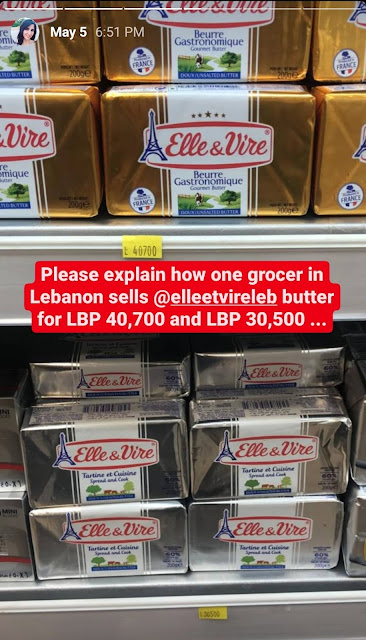In Beirut, Shopping Around Is Key To Beating The Huge Play on Prices
It’s no secret: prices across Lebanon for the vast majority of goods and services have witnessed an unprecedented spike as the lira continues to plunge against the dollar. Though the official rate is around LBP 1,500 for USD 1, the lira is trading on the black market for LBP 16,000 (current as of June 24, 2021), which translates to a whopping 967% surge in the exchange rate.
Over the past four months alone, I’ve seen prices of local
goods double. For example, Master Kettle Chips (144g) were
selling for LBP 8,000 in February, whereas now a bag goes for LBP 15,000. Candia
Lait 1-L TetraPak of milk are priced at 15,500 LBP, nearly double the LBP 8,000
tag they fetched at the start of the year.
The other
day I tweeted that “walking into a grocery store in Lebanon is like getting
back a graded exam. Your heart stops as you scan the numbers on the price
labels. It’s a harrowing experience.” But even more harrowing is the huge
spread in prices you’ll occasionally witness across retailers.
On May 5 of this year, I displayed such a divide on my
Instagram stories, spotlighting Elle & Vire butter, which is imported from
France. This butter was selected to be subsidized nationally by the government,
and thus its price is fixed at LBP 8,870 for its “Tartine et Cuisine” line and
LBP 11,850 LBP for “Beurre Gastronomique.” In fact, a catchy yellow sticker is
affixed to each package of butter with the subsidized price so that there is no
doubt as to its regulated status.
However, I stumbled across a well-known grocer* who’s audaciously selling these butters for LBP 30,500 and LBP 40,700, respectively. That’s nearly triple the subsidized rate! Curiously enough, the conspicuous yellow stickers are missing.
 |
| Elle & Vire French butter at one retailer... |
 |
| ...versus the identical products at another retailer. Note the spread in prices! |
On my latest shopping excursions, I’ve discovered a few more discrepancies worth highlighting.
___________________________________________
Kellogg’s Rice Krispies (375-g box). Who knew Snap, Crackle and
Pop scored different appraisals at different shops? At one retailer, they’re
selling for LBP 37,500, while at another they’ll set you back LBP 69,999. At
yet another, they’re for LBP 75,000. Ouch. That’s exactly double.
 |
| Kellogg's Rice Krispies sells for LBP 37,500 at one retailer |
 |
| At another retailer, Kellogg's Rice Krispies sells for nearly LBP 70,000. Price was determined via said retailer's shopping app. |
Kellogg’s Special K Klasik (375-g bag). I nabbed several bags
of these multi-grain textured flakes on sale for LBP 18,950, while other stores are asking
for LBP 34,750 and upward. One might conjecture that they’re on sale perhaps because
the expiration date is nearing? Not true. I checked, and they all reflect the same
batch, country of origin, and expiry.
 |
| Kellogg's Special K Klasik edition for LBP 18,950 |
 |
| Price check on a popular shopping app reflects a tag of LBP 34,750 for the same bag of Kellogg's Special K Klasik |
St. Dalfour jams (284-g jar, flavors like Orange & Ginger, Apricot,
Strawberry, Blackberry). When it comes to jams, St. Dalfour, produced
in France, is my absolute favorite because their whole lineup is fashioned
exclusively from fruit and fruit juices, without the addition of sugars,
sweeteners, or unnecessary gunk. I unearthed a selection of them for LBP
32,950 (not pictured below), which sent my jaw dropping, because elsewhere, St. Dalfour commands
anywhere between LBP 63,500 and LBP 82,590, depending on the flavor. Quelle horreur, n’est-ce pas?!
 |
| St. Dalfour French jams priced between LBP 67,999 and 71,999 at one retailer |
 |
| The same jams fetch price tags ranging between LBP 63,500 and LBP 82,590 elsewhere |
The idea is to shop around and pay close attention to pricing, particularly on foreign products imported by distributors. That’s where you’re likely to see a significant play on prices. The price of local brands is typically set by the brand itself here in Lebanon, so these figures should be identical across stores.
That is, unless you’re visiting the landmark Cafématik at Beirut International Airport, where you can be sure to expect assault and robbery. Their prices are so astronomically high you’d sooner drink the tap water from the bathroom faucet without batting an eyelash. You might even convince yourself to wait until arrival at Paris’ Charles de Gaulle airport, where a bottle of ritzy Evian goes for less than that of Lebanese mineral water at Cafématik. I know I certainly would.
*Note: I have chosen not to disclose the names of retailers. Except in the case of government-subsidized and hence price-regulated products, retailers are free to price products at their own discretion.



Comments
Post a Comment